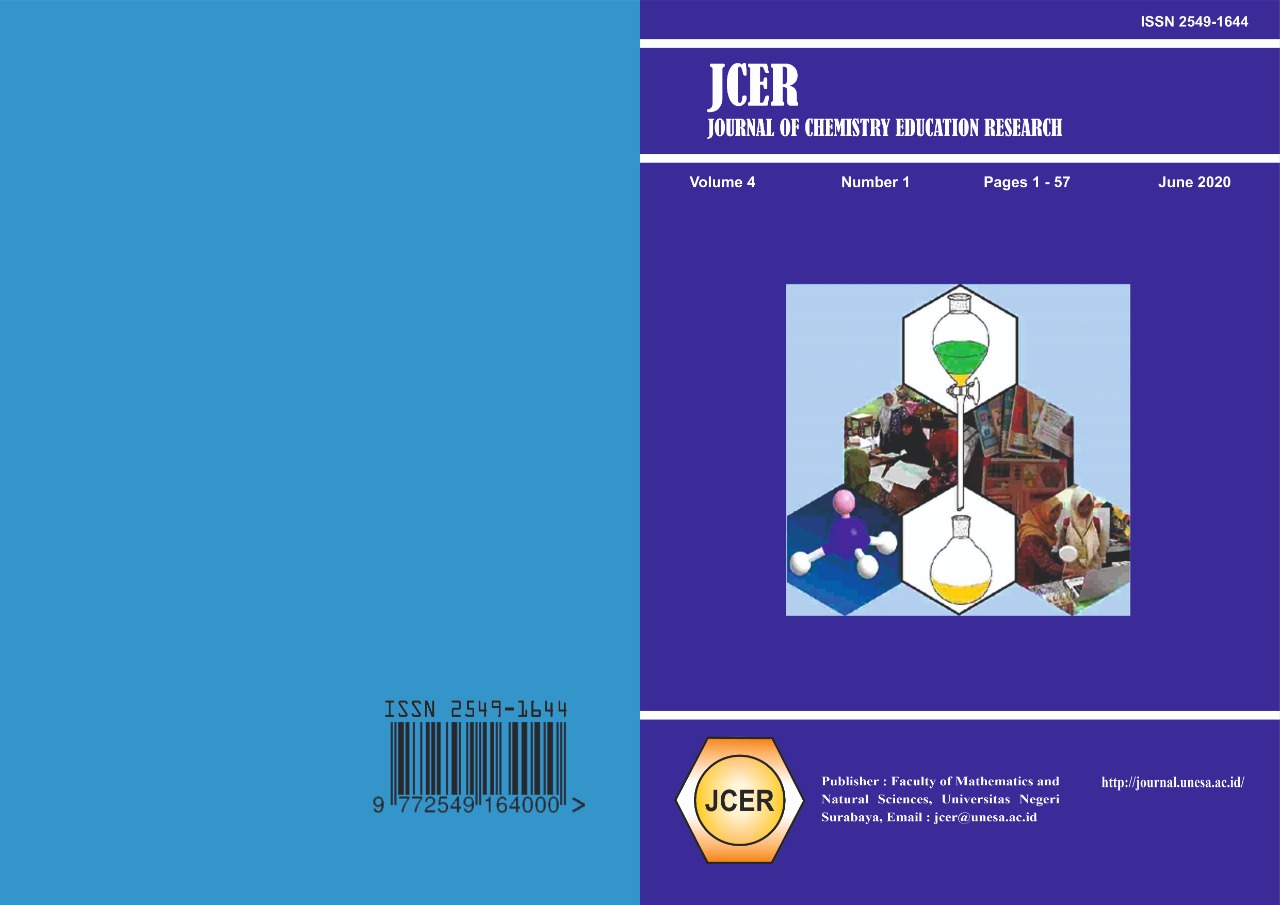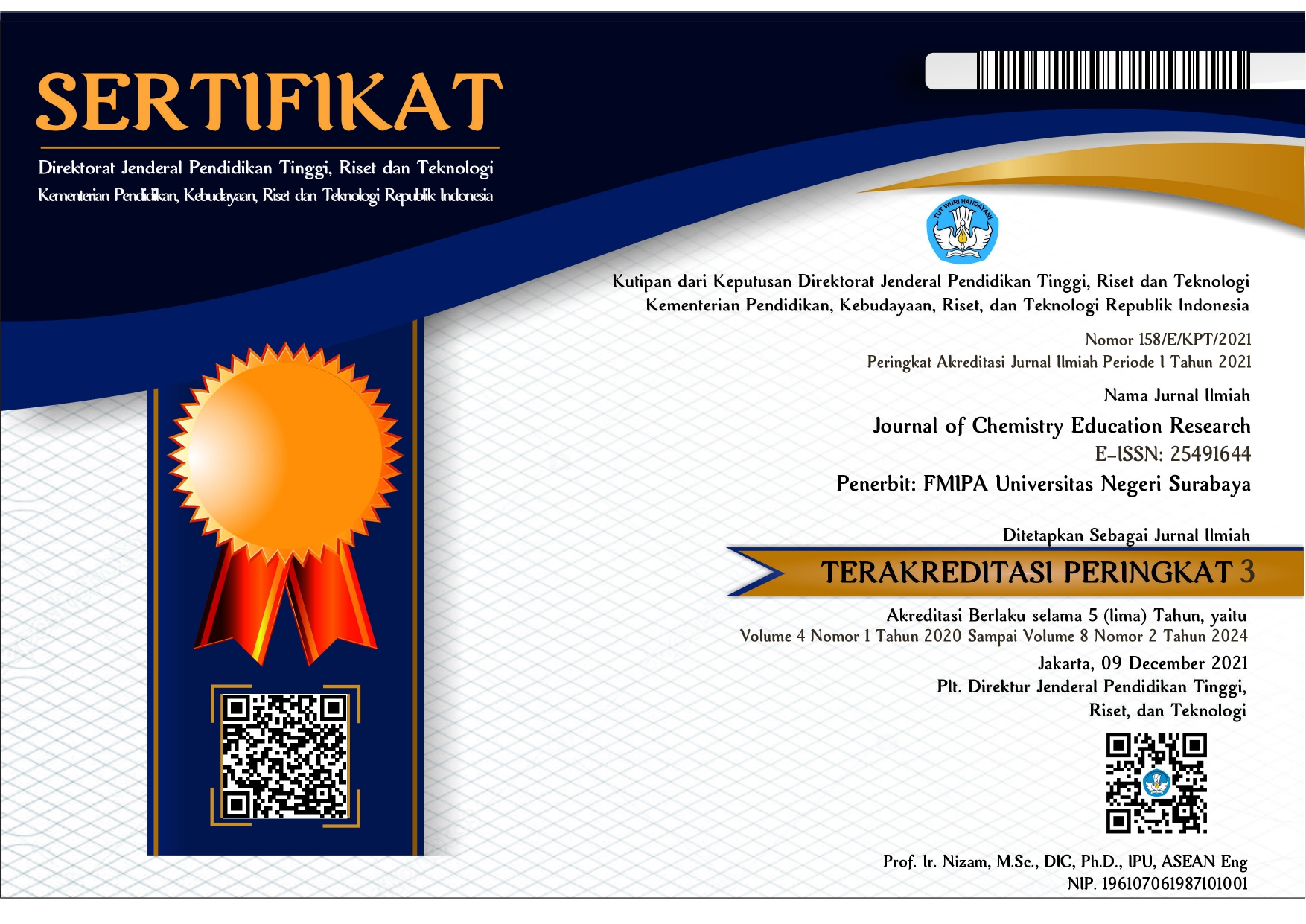THE INFLUENCE OF CYCLE LEARNING MODEL INTEGRATED BY THINK PAIR SHARE AND STUDENT TEAM ACHIEVEMENT DIVISSION ON QUALITY OF PROCESSES AND COGNITIVE LEARNING OUTCOMES
DOI:
https://doi.org/10.26740/jcer.v4n1.p23-32Keywords:
Hydrocarbons, LC 5E - TPS Learning Model, LC 5E - STAD Learning Model, Process Quality and Learning OutcomesAbstract
Hydrocarbons are one of the materials from Chemistry that studies abstract concepts and procedural knowledge such as alkanes, alkenes and alkyas. To study hydrocarbon material, students must master well the concepts related to previous concepts such as the concept of covalent bonding and equalizing reactions. If students do not understand the concepts related to hydrocarbon material, it will be difficult to master the concepts in hydrocarbon material. The learning process at school at this time sometimes also still does not increase student creativity and activity. The application of the Learning Cycle 5E learning model combined with cooperative type TPS (Think Pair Share) and cooperative type STAD can be used as an alternative to developing a more meaningful learning atmosphere in understanding concepts and giving students the opportunity to work together to solve problems. The purpose of this study was to determine: the quality of the learning process using the LC 5E - TPS and LC 5E - STAD models on the topic of hydrocarbons, as well as differences in the cognitive learning outcomes of hydrocarbon students who were taught with these two learning models. This study uses a quasi-experimental design with "Postest Only Group Design". The sample of this study was students of class XI IPA1 and class XI IPA2 of SMAN I Parang in the 2019/2020 school year, each consisting of 21 people. Class XI IPA1 as an experimental class taught with LC 5E - TPS model and class XI IPA2 as an experimental class taught with LC 5E - STAD model. Research data in the form of observations of the quality of the learning process, the results of observations of students 'cooperative abilities and students' post test scores. Research data were analyzed using t test. The results showed that the quality of the learning process by using the LC 5E - TPS model and the LC 5E - STAD model were included in both categories. Students' cooperative skills in both learning models are included in both categories. Cognitive learning outcomes of students in learning with the LC 5E - TPS model are higher than in learning with the LC 5E - STAD model.References
[1] Ninis, dkk. 2014. Pembelajaran Kimia dengan Model Learning Cycle 5E untuk Meningkatkan Penguasaan Konsep dan Keterampilan Berpikir Kritis Siswa SMK pada Pokok Bahasan Termokimia. Surabaya: Prosiding Seminar Nasional Kimia, ISBN : 978-602-0951-00-3Jurusan Kimia FMIPA Universitas Negeri Surabaya.
[2] Slavin, R.E. 2008. Cooperatif Learning Teori Riset dan Praktik. Bandung: Nusa Media.
[3] Suprijono, A. 2010. Cooperative Learning Teori dan Aplikasi PAIKEM. Yogyakarta: Pustaka Pelajar.
[4] Kagan, S.& Kagan, M. 2009. Kagan Cooperative Learning. Kagan Publishing.
[5] Rahayu, S. 2002. Kecenderungan Pembelajaran Kimia di Awal abad 21. Jurnal MIPA dan Pembelajarannya 31 (2): 271-291
[6] Rahayu, S. 2012. Modul Pengembangan Model Pembelajaran. Malang: Universitas Negeri Malang Panitia Sertifikasi Guru Rayon 115.
[7] Titisari, Ratna. 2010. Upaya Peningkatan Keaktifan dan Prestasi Belajar Siswa dengan Menggunakan Metode STAD pada Pokok Bahasan Pemisahan campuran kelas VII D SMP Negeri 2 Kemalang. Surakarta: FKIP, Skripsi Universitas Negeri Sebelas Maret.
[8] Anah, Dami dkk. 2013. Perbedaan Pengaruh antara Model Kooperatif tipe TPS dan STAD terhadap Hasil Belajar IPS. Surakarta. PGSD FKIP Universitas Sebelas Maret.
[9] Sujianto, A.E. 2009. Aplikasi Statistik dengan SPSS 16.0. Jakarta : PT. Prestasi Pustaka.
[10] Wijaya, T. 2012. Praktis dan Simpel Cepat Menguasai SPSS 20 untuk Olah dan Interpretasi Data. Yogyakarta: Cahaya Atma Pustaka
[11] Arikunto, S. 2008. Dasar-dasar Evaluasi Pendidikan. Jakarta: Bumi Aksara.
[12] Lie, Anita. 2010. Cooperative Learning:Mempraktikkan Cooperative Learning di Ruang-Ruang Kelas. Jakarta: Grasindo.
[13] Trent, K.S. 2013. The Effects of The Instruction Technique Think-Pair-Share On Students Performance in Chemistry. B.S., Nicholls State University.
Downloads
Published
Issue
Section
 Abstract views: 335
,
Abstract views: 335
, PDF Downloads: 382
PDF Downloads: 382



